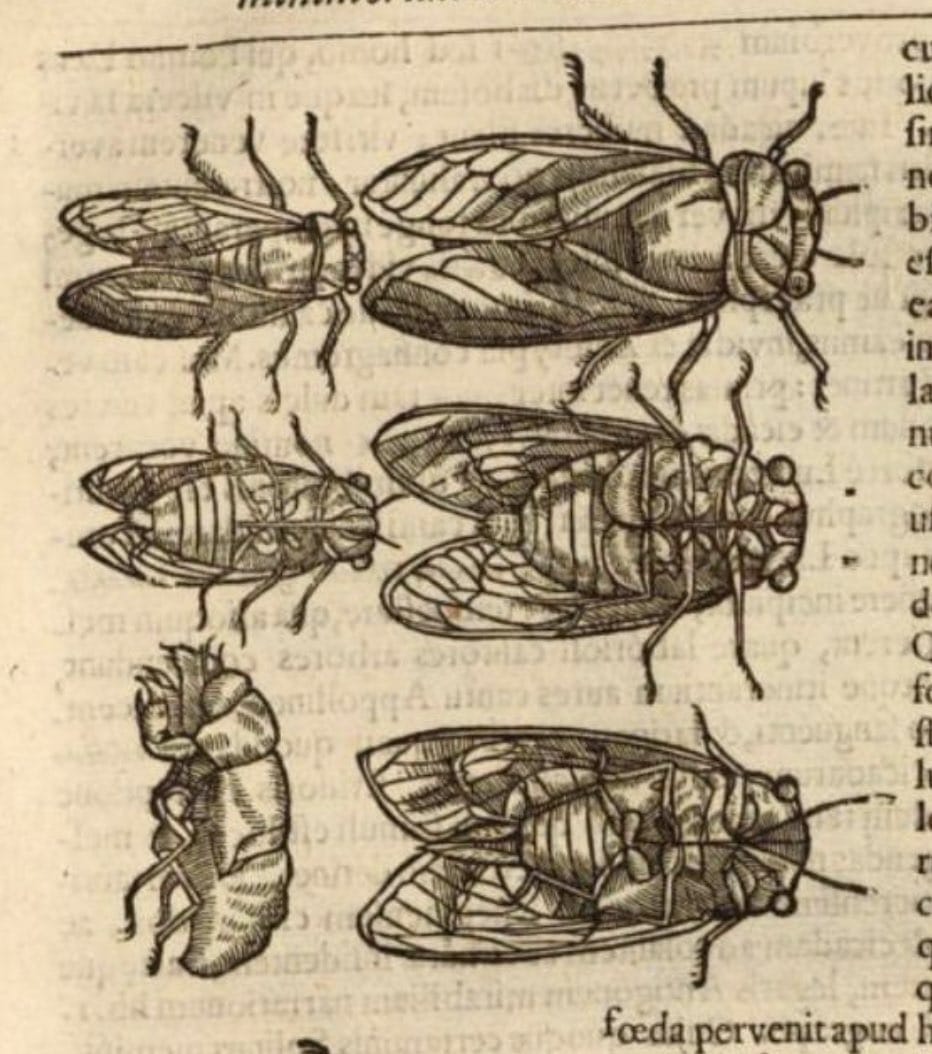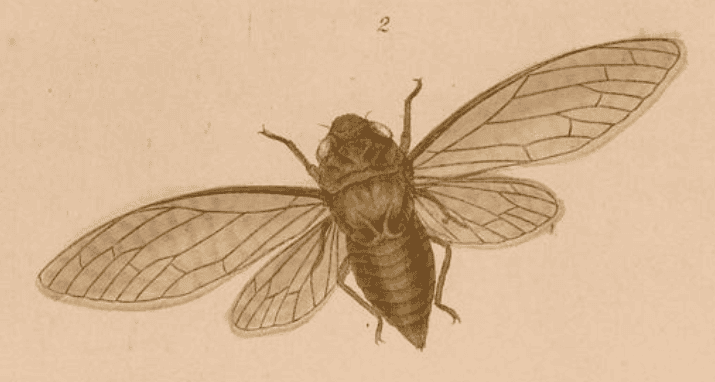Cicada Slough, Chan Tui 蝉蜕Cicada molt, Cicada slough, Cicada PeriostracumChan Tui (TCM) |

|
 Cicada
CicadaInsectorum sive Minimorum Animalium Theatrum, 1634

 Two species of Cicada common in China
Two species of Cicada common in ChinaNatural history of the insects of China, Donovan, 1842
Entomological name:
Cryptotympana pustulata
Various other species have been used including Cicada flammata
Parts used:
Molting; discarded shell
Temperature & Taste:
Cool, dry. Salty, Sweet
Classifications:
A. Clear Exterior Wind-Heat
Uses:
1. Clears Wind-Heat:
-Wind-Heat external attack with Sore Throat, Hoarseness, Loss of Voice
-acute Cough from Wind-Heat, especially in Children
2. Clears Heat, Promotes the Expression of Rashes:
-promotes expression of rashes in Measles, Chicken Pox, Small Pox
-skin diseases with red, itchy lesions
3. Clears Wind-Heat, Benefits the Eyes:
-red, painful, sore, swollen and itchy eyes
-previously highly regarded in preventing Small Pox from affecting the eyes.
-Blurry Vision
4. Clears Wind-Heat, Stops Spasms:
-Childhood fever leading to Convulsions, Delirium, Night Tremors
-Tetanus
5. Promotes Labor:
-traditionally to promote Labor and expel Afterbirth
Dose:
In Powder: 1–3 grams;
In Decoction: 3–9 grams
Comment:
Its ‘signature’ is of throwing off things from the surface of the body. Therefore it is good for acute Heat diseases affecting the surface of the body, the skin, and the eyes.
Preparation:
1. The shells should be washed with boiling water to remove dirt, foreign matter and residue, then dried.
2. Some recommended removing the 2 large front legs when used to promote sweating, while leaving them on when used to treat eye diseases. Some practitioners believe the body is best for Wind and spasms with the legs being most cooling and better to clear Wind and Heat.
Main Combinations:
1. Acute Wind-Heat with Fever, Coughing:
i. Cicada shell (Chan Tui) with Peppermint (Bo He), Peucedanum Qian Hu, Burdock seed (Niu Bang Zi)
ii. Cicada shell (Chan Tui) with Duckweed (Fu Ping), Peppermint (Bo He), Forsythia Lian Qiao
2. Sore Throat, Loss of Voice, acute Cough, Cicada shell (Chan Tui) with Chrysanthemum (Ju Hua) and Mulberry leaf (Sang Ye)
3. Asthma, Cicada shell (Chan Tui) with Apricot kernel (Xing Ren), Gypsum (Shi Gao), Fritillaria Bei Mu, Job’s Tears (Yi Yi Ren), Houttuynia Yu Xing Cao, Honey-fried Licorice (Zhi Gan Cao) (as in Qing Fei Shen Shi Tang)
4. To promote Expression of Rashes:
i. Cicada shell (Chan Tui) with Peppermint and Chrysanthemum
ii. Cicada shell (Chan Tui) with Burdock seed (Niu Bang Zi), Pueraria Ge Gen
5. Red, Itchy skin lesions:
i. Cicada shell (Chan Tui) with Sophora Ku Shen, Saposhnikovia Fang Feng
ii. Cicada shell (Chan Tui) with White Dittany (Bai Xian Pi), Saposhnikovia Fang Feng
iii. Cicada shell (Chan Tui) with Tribulus (Ci Ji Li), Paeonia Bai Shao, Saposhnikovia Fang Feng
6. Boils, Abscesses, Carbuncles, Cicada shell (Chan Tui) with Coptis Huang Lian, Lonicera Jin Yin Hua, Saposhnikovia Fang Feng, Peonia Chi Shao Yao (Red Peony), Asarum Xi Xin, White Dead Silkworms (Bai Jiang Can), Eupatorium Pei Lan, Paris root Chong Lou., Licorice root
7. Eye disorders from Wind-Heat:
i. Cicada shell (Chan Tui) with Chrysanthemum (Ju Hua), Horsetail (Mu Zei)
ii. Cicada shell (Chan Tui) with Tribulus seed (Ci Ji Li), Paeonia Chi Shao Yao, Abalone shell (Shi Jue Ming)
iii. Cicada shell (Chan Tui) with Equisetum Mu Zei (Horsetail), Dodder seed (Tu Si Zi), Tribulus (Ci Ji Li), (Chinese Materia Medica, Stuauoft)
8. Convulsions, Night Terrors from Liver wind:
i. Cicada shell (Chan Tui) with Scorpion (Quan Xie), White Dead Silkworm (Bai Jiang Can), Uncaria Gou Teng
ii. Childhood convulsions from Internal Wind, with Gastrodia Tian Ma, Scorpion (Quan Xie), White Silkworm (Bai Jiang Can), Cicada shell (Chan Tui) (as in Gou Teng Yin Zi from Xiao Er Yao Zheng Zhi Jue [Key to Syndrome Identification and Treatment of Diseases in Infants]).
9. Night-crying in young children, take the powder (front legs removed) and administer with Uncaria Gou Teng (Li Shi Zhen)
10. As an external wash for Itching, Cicada shell (Chan Tui) with Polygonum Ye Jiao Teng
Major Formulas:
Bo Ying Compound
Xiao Feng San
Si Wu Xiao Feng Yin
Cautions:
1. Not used during pregnancy
Main Preparations used:
Click the Tabs above for more information on this Medicin
ANTIBACTERIAL:
–Preparation of chitooligosaccharides from cicada slough and their antibacterial activity.
ANTI-OXIDANT:
–Antioxidant and anti-inflammatory activities of N-acetyldopamine dimers from Periostracum Cicadae.
ANTI-INFLAMMATORY:
–Antioxidant and anti-inflammatory activities of N-acetyldopamine dimers from Periostracum Cicadae.
HYPOTHERMIC:
–Studies on the anticonvulsive, sedative and hypothermic effects of Periostracum Cicadae extracts.
SKIN DISEASE / DERMATITIS:
–Extract from Periostracum cicadae Inhibits Oxidative Stress and Inflammation Induced by Ultraviolet B Irradiation on HaCaT Keratinocytes.
–Cicadidae Periostracum Attenuates Atopic Dermatitis Symptoms and Pathology via the Regulation of NLRP3 Inflammasome Activation.
ALLERGIC RHINITIS:
–Characteristics of traditional Chinese medicine use for children with allergic rhinitis: a nationwide population-based study.
ANTIASTHMATIC:
–Cryptotympana pustulata Extract and Its Main Active Component, Oleic Acid, Inhibit Ovalbumin-Induced Allergic Airway Inflammation through Inhibition of Th2/GATA-3 and Interleukin-17/RORγt Signaling Pathways in Asthmatic Mice.
SEDATIVE:
–Studies on the anticonvulsive, sedative and hypothermic effects of Periostracum Cicadae extracts.
ANTI-CONVULSIVE:
–Studies on the anticonvulsive, sedative and hypothermic effects of Periostracum Cicadae extracts.
ANTI-EPILEPTIC:
–Antiepileptic Effects of Cicadae Periostracum on Mice and Its Antiapoptotic Effects in H2O2-Stimulated PC12 Cells via Regulation of PI3K/Akt/Nrf2 Signaling Pathways.
NEPHROPROTECTIVE:
–Dimeric N-Acetyldopamine Derivatives Featuring a Seco-Benzene System from the Insects Aspongopus chinensis and Periostracum cicadae.
–Effects of Periostracum Cicadae on Cytokines and Apoptosis Regulatory Proteins in an IgA Nephropathy Rat Model.
ANTI-CANCER:
–[Studies on Chinese medicines used in cancer. IV. Antitumor constituents in rhizoma zedoariae, periostracum cicadae, galla wisteriae, and radix Hostae].
–Cytotoxic activities of various fractions extracted from some pharmaceutical insect relatives.
